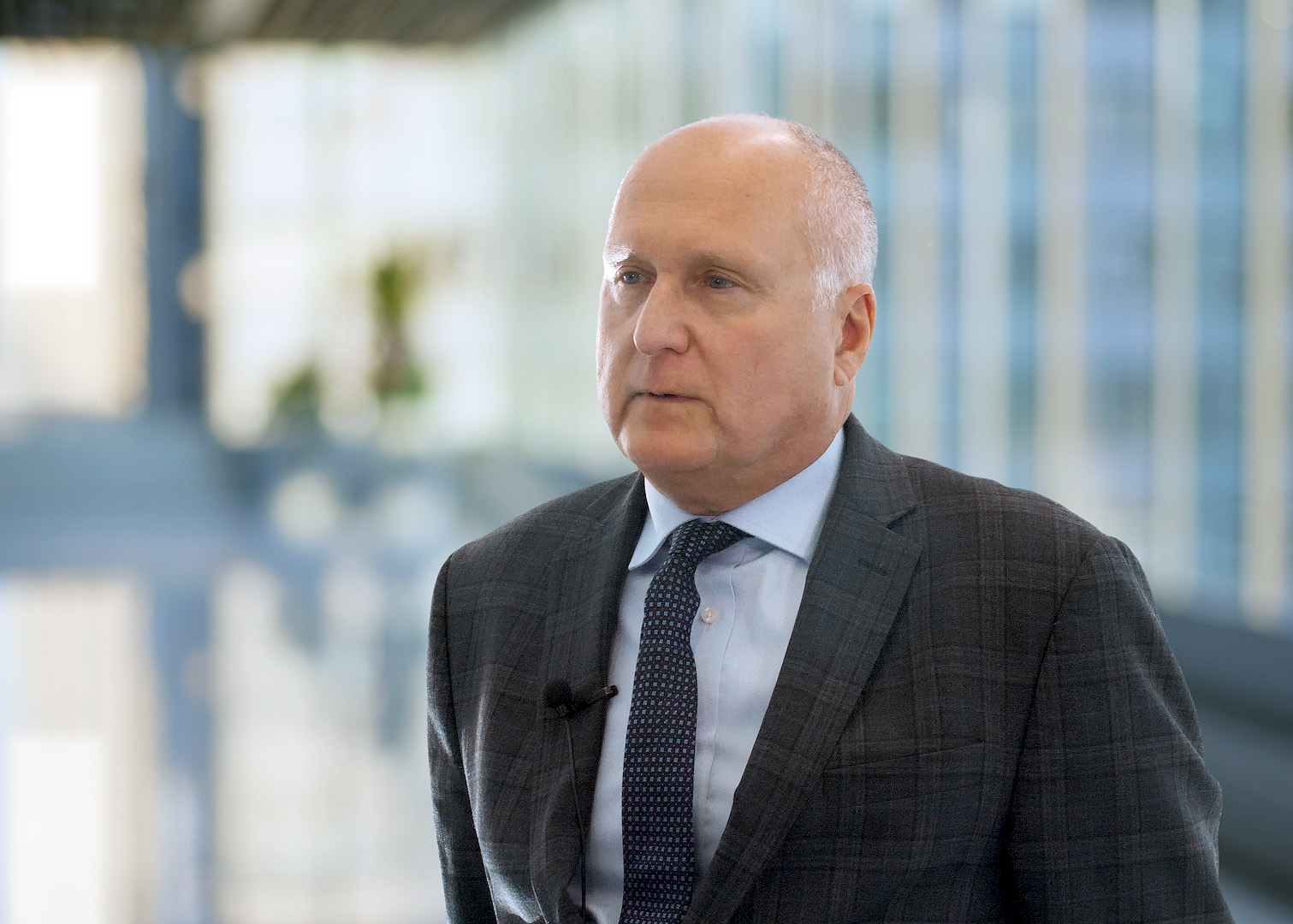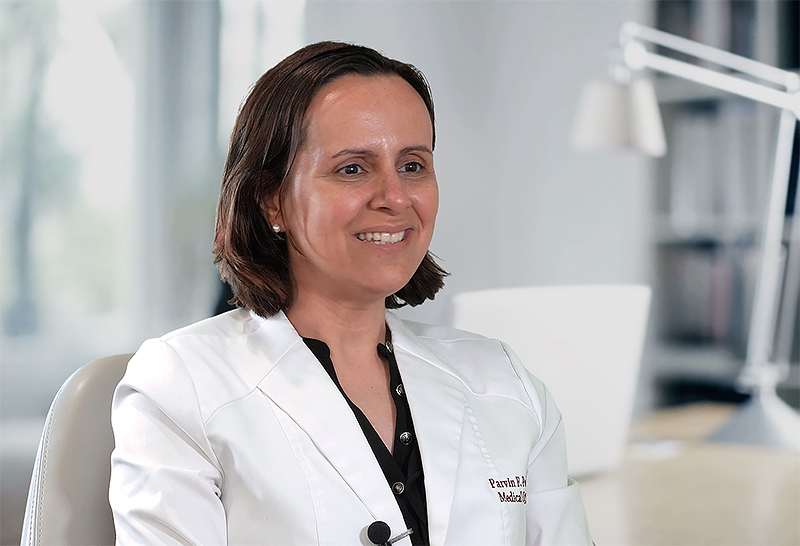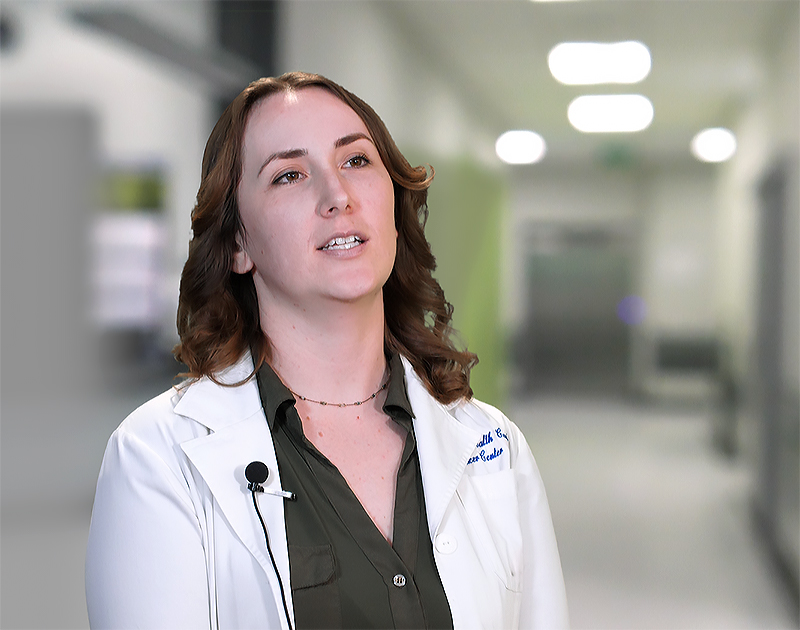
Kim Margolin, MD; Przemyslaw Twardowski, MD; Leland Foshag, MD; Parvin Peddi, MD; Santosh Kesari, MD; Emma Chacon, RN, Discuss the Impact of Clinical Trials and Research.
Saint John’s Cancer Institute (research) and Saint John’s Health Center (clinic) work together to offer patients cutting-edge clinical trials and care for those in the most need. The medical oncology director for urologic cancers and disorders and principal investigator, Dr. Przemyslaw Twardowski, notes, “clinical trials are particularly valuable in patients who may have very advanced, heavily pretreated cancer, where there is no available effective standard of care. Promising experimental therapies have significant value in those circumstances.”
This institute was founded on the basis of clinical trials, back more than 30 years ago, beginning with a variety of melanoma vaccine trials under the direction of Donald L. Morton. He developed the technique of sentinel lymph node procedure which was validated and has been completely shown to change the surgical management of primary melanomas.
– Dr. Leland Foshag
Clinical trials are research studies in which people volunteer to help find answers to specific health questions. When carefully conducted, they are the safest and fastest way to find new treatments and new ways to improve health, according to the FDA. “Whenever a new drug is studied in the lab, the first thing you need is to actually test it out. First in a small number of patients, just to see that it is safe, and make sure that it really is starting to work. Then, to see in a bigger trial, whether it beats what’s on the market. This is how we have made stride after stride in all cancers; how we made cancers that are incurable to curable…The field of breast cancer has really benefited.” says Dr. Parvin Peddi.
What we are learning is that every person is unique. The tumors are different, even though they are called the same thing.
– Santosh Kesari, MD
What kind of trials are conducted at Saint John’s Cancer Institute?
- Phase 1–dose escalation– is on the edge of cutting research. These trials are considered to be, “first in human.” Meaning, they have never been tested on a person, and we are looking to find the safest dose with the least number of side effects.
- Patients who participate in phase one trials are those who have usually exhausted all other types of treatments because they’re not responding to standard of care.
- Phase 2 –dose expansion– expand a trial to more patients. In phase one trials, the safest dosage was determined, and in phase 2, efficacy is determined.
- Phase 3 –general population– is proof of concept. When efficacy and safety has been determined in phases 1 and 2, phase 3 works towards getting approval from the FDA, so these treatments can became a standard of care.
- Phase 4 –post-marketing– is typically not done at SJCI because we maintain a mix of trials for cutting-edge research.
Listen to our experts in medical oncology and surgical oncology explain the benefits of clinical trials
Doctors, Kim Margolin, Santosh Kesari, Przemyslaw Twardowski, Parvin Peddi, Leland Foshag, and Emma Chacon, RN, deep dive into clinical trials and their significance to their patients and others.
How does someone get onto a clinical trial at Saint John’s Cancer Institute?
- Initially, discuss with your physician if a clinical trial is right for you.
- When there’s a specific trial you are interested in, that will be our focus.
- The clinical trial research team, a research nurse and a coordinator, will speak to you regarding protocols and determine eligibility.
“With clinical trials, it’s not anything that is mandatory, it’s completely voluntary. We’re seeking to give people treatment options if they would like them. For a clinical trial, we have to go through a rigorous process of making sure we are finding the right patient. That means we need to assess them,” says Emma Chacon, a research nurse at Saint John’s Cancer Institute.
You are ELIGIBLE for a trial!
- A patient signs a consent form with their research nurse after the principal investigator has explained the trial and answered all questions.
- The research coordinator will schedule all eligibility tests/procedures, this will depend on the study.
- Once all tests and procedures are completed/confirmed, a patient will start on a clinical trial.
- Patients are designated a research nurse, and coordinator throughout the course of care.
- The patient can call their research team at any time with questions.
- The benefit of being in a clinical trial is more focused care.
- When on a trial your health is closely monitored.
Why don’t you know about Clinical Trials?
“Community physicians tend to look to clinical trials as a last resort for their patients,” Bethany Wendel, Senior Manager of Clinical Research states. She continues, “in the face of alternative treatments, as an example, immunotherapy, clinical trials are often the best first options for patients who are looking to avoid the standard chemotherapy for their disease.” Medical oncology director for the Margie Petersen Breast Cancer Clinic, Dr. Parvin Peddi, further supports Bethany’s claim, “as a patient, you should always ask your doctor, can I have access to a clinical trial? I understand this is the standard, but can something else be tried that could be better than this? It’s critical that patients are offered [clinical trials] and discuss with their doctors what trial they can enroll in… and we have many here that are open at Saint John’s.”
Bridging the Inequity Gap in Clinical Research
Ensuring people from diverse backgrounds join clinical trials is key to advancing health equity. Participants in clinical trials should represent the patients that will use the medical products. At Saint John’s Cancer Institute, we are constantly trying to bridge the inquietly gap seen in health care. Saint John’s Health Center has donated 2 million dollars to Stand-Up 2 Cancer’s campaign for colorectal cancer disparity seen in Black-African Americans, and Native American populations, where colorectal cancer presents highest. Dr. Anton Bilchik, Chief of General Surgery, Professor of Surgical Oncology in Gastrointestinal and Hepatobiliary Tumors is leading the charge, as part of the DREAM Team. Learn more about this initiative here.
The biggest obstacle to get into a clinical trial is eligibility, particularly in phase one trials, because of the frequency of visits required by the trial. Even if you are ineligible, there may be a way at Saint John’s Cancer Institute. “In many cases, patients may not qualify for trials for one reason or another, and in those situations, we still have options. We have the latest in molecular profiling to come up with innovative treatment options for patients when they don’t qualify,” Dr. Santosh Kesari, medical oncology director for neurosciences and brain cancers.
Even in trials that don’t work, there are a subset of patients that do respond very well. And as we open more trials, the more options we give patients, the more chances the patient has to respond to something. Until we do the trial, we don’t’ know what the benefit is. I think that is the exciting and the anxiety provoking part of any clinical trial for the doctor as well as the patient, because of the uncertainty.
– Santosh Kesari, MD
Where can I find clinical trials?
- A good way to find out if there are clinical trials that might help you is to ask your doctor.
- FDA Clinical Trials Search. Search a database of Federally and privately supported studies available through clinicaltrials.gov.
- Clinicaltrials.gov. Conduct more advanced searches.
- National Cancer Institute. Learn about clinical trials for people with cancer.
- Saint John’s Cancer Institute Website, for trials in the Los Angeles area.
Saint John’s Cancer Institute’s clinical trials focus primarily on breast, melanoma, neurologic, and urologic cancers. In the future, we will have trials that focus on women’s cancers, such as ovarian, endometriosis, and uterine. The principal investigator, Dr. Hyo Park, an expert surgeon in gynecologic cancers and diseases will lead these clinical trials.
Trials for Brain Cancers
“Clinical trials are very important, especially in the area of brain cancer, because the need is so great, ” says Dr. Kesari. Dr. Kesari is globally recognized as one of the foremost experts in glioblastomas, and other neurologic tumors and diseases. His active trials include:
- Trials for brain cancer that involve surgery with surgical clinical trials making vaccines out of tumor tissue.
- Trials involving doing radiation after surgery in the OR, Intraoperative Radiation Therapy (IORT).
- Variety trials for newly diagnosed Brain tumors versus at the first recurrence or second, or further recurrence.
Trials for Melanoma and Skin Cancers
“Most of our clinical trials in melanoma, and other skin cancers, are based on some form of immunotherapy,” says Dr. Kim Margolin, medical oncology director for the melanoma and skin cancer program at SJCI. Immunotherapy, “acts to cause the body to make its own antigens and then sensitize the immune cells against those antigens. Very similar to any other vaccine. However, when it’s given to patients who are at high risk of developing a cancer, or those who’ve had the cancer removed and have no more than a tiny trace of the tumor in the body, those vaccines may be far more powerful.”
Dr. Margolin’s clinical trial research spans over several decades. Amongst her peers and the nation, she is highly honored and respected as an expert medical oncologist in melanoma and melanomas that metastasize to the brain. Her active trials include:
- A trial randomized three ways for patients who had their melanoma removed and lymph nodes drained.
studies of intralesional therapies. - A novel imaging pet scan trial
- 2nd and third-line studies for patients who can’t get into long-term remission from their first-line treatment.
- A lesioned injected study.
Trials for Urology
“The clinical trial is really my main focus, as far as clinical research. It’s the most exciting part of oncology when you can participate in the process of development of new exciting compounds and push the field forward. This is the only mechanism in existence that allows the development and ultimately approval of new drugs for cancer, for our patients,” says Dr. Twardowski. Dr. Twardowski is one of Saint John’s Cancer Institute’s medical oncologists on the forefront of novel research. His active trials include:
- White Button Mushroom Trial for prostate cancer patients
- Various trials for relatively early diagnosis of cancers, where standard of care treatments are given in addition to a novel experimental agent that is postulated to improve the outcomes of already existing effective therapies.
Trials for Breast Cancers
“We are enrolled in multiple breast cancer trials right now,” says Dr. Parvin Peddi, principal investigator. Dr. Peddi practices at the Margie Petersen Breast Center at Providence, Saint John’s Health Center. She has many open and actively enrolling trials. They include:
- Trials with new imaging modalities for breast cancer patients.
- Trial for a new immunotherapy drug for triple-negative breast cancer patients, who don’t qualify and cannot get any benefit from the immunotherapy drugs that are currently on the market.
You don’t lose anything and have everything to gain by enrolling in a clinical study.
– Parvin Peddi, MD
Emma Chacon, one of our research nurses, who works with patients in clinical trials, would like everyone to know, “it’s something you can withdraw from at any time, it’s not a commitment that is for the rest of your life. We want to make sure we are giving you what you want. Your decision about your body should be informed.”
Listen to Mark Perzley discuss his experience in a clinical trial.
Mark Perzley sits down with Saint John’s Cancer Institute staff
Join the Newsletter
Saint John’s Cancer Institute (SJCI) emails a monthly newsletter to physicians in the greater Los Angeles area. This newsletter highlights our active and enrolling clinical trials that are in phase 1, phase 2, and phase 3. If you are a physician and would like to join the newsletter, please contact our Senior Manager in Clinical Research, Bethany Wendel.




